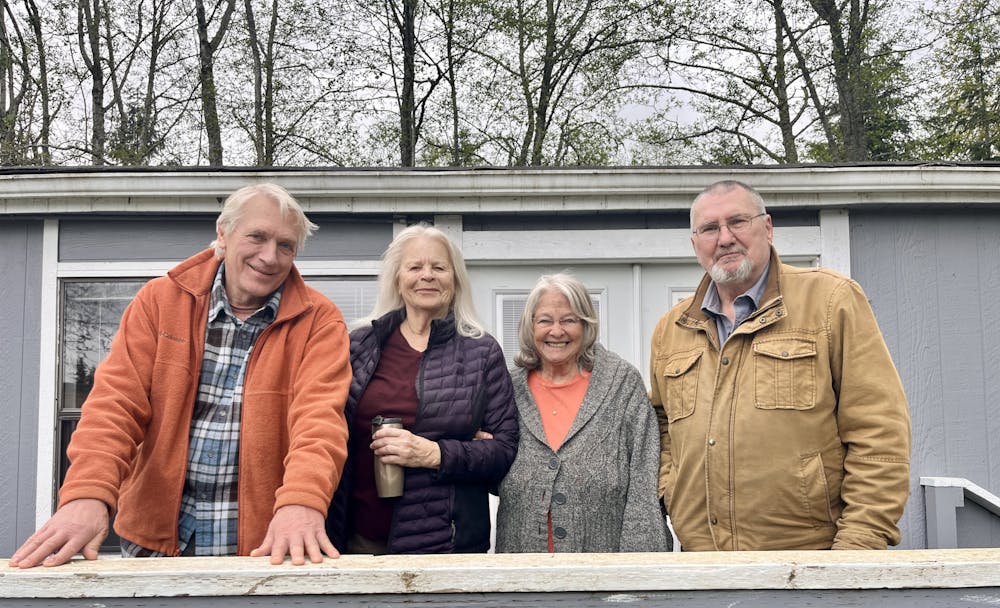South End Mobile Estates, a 55+ community located in Bellingham’s Happy Valley neighborhood, recently experienced a rent increase of 33% in March, from $600 to $800. The raise in expenses caused instability and uncertainty for its residents, many of whom rely on a fixed income.
The South End management team sent residents a letter in May 2024 notifying them of the increase but it did not go into effect until March of this year. The residents received a grace period of six months, starting in September, during which the landlord paid the extra $200 a month.
“When you’re on a fixed income and they raise your rent 200 bucks a month, and you’re touch-and-go anyway, that’s pretty devastating,” said Larry McGonigal, a longtime resident of South End.
Eric Lundin, a resident of South End for 11 years, expressed similar sentiments to McGonigal.
“It turned my life upside down,” he said.
Jean Brechan is a former onsite manager at South End. She's also among the residents who voiced their grievances over the rent increase.
“$200 a month can be a huge drop in financial stability,” she said.
According to McGonigal, some residents simply can’t comply with the new price change.
“There’s a lot of people that have just said they’re not going to do it. They’ve sold out, packed up, moving out — and there’s people in the process right now,” he said.
Unlike renting an apartment, when living in a mobile or manufactured home community, residents pay rent for the land their home sits on. This difference can make moving from one community to another financially strenuous.
Heather Beery is one of those people in the process of leaving South End.
“We didn’t have a chance, didn’t have a choice. We just got a letter,” Beery said.
In response to the dramatic rise in rent, Brechan and another tenant of South End, Will Stokes, attended a public comment period during the Bellingham’s City Council meeting on March 24. In their statements during the comment period, they both expressed their hopes that initiative 2023-02, which caps rent increases at 8% in a given year, could prevent a rent increase like this from happening again.
Initiative 2023-02 requires landlords to provide relocation assistance when their rent prices exceed an increase of 8% or more in a 12 month period.
According to Council Member Jace Cotton, however, the residents of South End do not qualify for assistance under this initiative.
“Initiative 2023-02 mandating relocation assistance only applied to residential rentals. Most manufactured homes cannot be moved, meaning that most [people] are locked into their tenancy with few options,” Cotton said.
House Bill 1217, however, will include manufactured homes. Much like Initiative 2023-02, it promises to improve housing stability by limiting rent and fee increases.
The bill has been passed by the house and the senate, but while waiting for it to be signed into law, South End resident Aurela Sequoia is encouraging her fellow residents to email their legislators.
“This is an important resource for people to get their voices heard,” Sequoia said.
While organizing to reach out to legislators is one way to protect the stability of their community, the residents of South End are still experiencing other difficulties onsite.
From driveways flooding during heavy rain to having to pay upwards of $500 for the removal of fallen tree limbs from homes and vehicles, residents are experiencing hazardous and pricey situations that they can’t afford in conjunction with the rent increase.
For many, packing up and moving isn’t an option.
“If it wasn’t here, then most of these people here, with the way rent is around town, wouldn’t have any other options. They couldn’t afford to live any place else. And I surely couldn’t either,” McGonigal said.
Patty Johnson, South End’s current onsite manager, outlined the rise in rent from a managerial perspective in an email.
“I know this is difficult for the tenants as they are elderly and most are low (fixed) income, mainly Social Security,” Johnson wrote. “However, our lot rents are low compared to some others. Lakeway Estates, across from Fred Meyer, charges $1,400 for their lot rents.”
Johnson also added that tenants’ rent covers water and sewer, but that they are responsible for everything from the main road in. Any other issues, including flooding near their door or trees pushing into their homes, must be paid for out of pocket.
Although House Bill 1217 may not be able to cover every issue that residents face at South End and in Bellingham’s other communities, it does promise to limit rent and fee increases.
Brenna Witchey (she/her) is a city life reporter for The Front this quarter. She is a third-year news/editorial pre-major and English minor. When she’s not working on a story, she likes practicing yoga, reading and going to the gym. You can reach her at brennawitchey.thefront@gmail.com.






